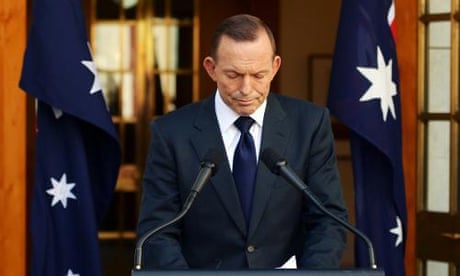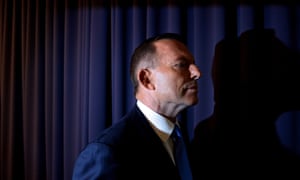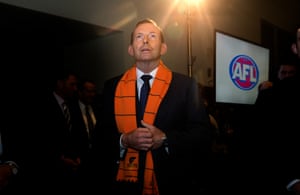Extract from The Guardian
The ousted PM never strayed from the belief that
his God-given mission was to save a nation in peril. But Australians
didn’t buy it – we don’t see ourselves that way
Tony Abbott in the Blue Room of Parliament House
when he addressed the media on Monday after Malcolm Turnbull’s
challenge to his leadership. Photograph: Sam Mooy/EPA
Friday 18 September 2015 12.57 AEST
Tony Abbott is fading fast. Within days of his
fall he’s looking like a prime minister we once had a long time
ago. The drama of his
execution this week was muted by the lingering disbelief that he
was ever there. His government has slipped easily into the past. He
is gone and barely missed.
“The beauty of being leader is you are freer to
be yourself,” he remarked five years ago after becoming leader of
the opposition. But that self proved, in the end, not made for the
politics of today.
Abbott was a brawling politician of great skill
but he was also – and fatally – still in many ways the cold war
kid who rode out with Bob Santamaria’s forces in the late 1970s to
confront the zeitgeist and save western civilisation.
Along the way, Abbott would abandon nearly every
policy Santa stood for but he never lost the old man’s fear of the
future and the belief that his God-given mission was to save us from
enemies we don’t even realise are there.
In Abbott’s political imagination danger lurks
everywhere. Whether it’s the death cult abroad or the ABC at home,
there is always more at stake than meets the eye. Ruin is at hand.
Combat is imperative. Hyperbole is the order of the day.
In the end, that didn’t wash with Australia.
Abbott used to talk of himself as a mutt chasing a
car. What happens, he used to wonder, when the dog catches the
vehicle? The answer when he became prime minister turned out to be:
not much.
It’s not that he didn’t have ideas. Opinion
pieces were his strength in his early career as a journalist. Even as
minister for health – and he was a good minister – he liked to
lock himself away for days at a time to write newspaper pieces in
which he threw around big, bold ideas.
But missing from these tens of thousands of words
was much about strategy. Abbott does not have the profoundly
professional imagination of John Howard, whose mind focused
instinctively on the task of getting where he wanted to go.
Without his superb talent for political conflict,
he would never have brought his party in from opposition. True, he
wrecked the joint to get there, but the
victory of 2013 can never be taken away from him.
That’s when his troubles began. He found he had
little to carry him forward when he came to power except his instinct
for brawling. There was no strategy. Persuasion was at a minimum. He
picked fights everywhere. Like the worst of world war one’s
generals, he led his government straight at the machine guns.
In opposition he had built up a great political
asset: trust in his word. That he was caught out so often ducking and
weaving didn’t matter. Abbott convinced Australia that he was the
truth teller and his opponent, Julia Gillard, the liar.
This political gold was squandered
in his first budget. From that strategic error, Abbott never
really recovered. That the budget picked so many fights he couldn’t
win only compounded a fundamental miscalculation that reduced Abbott
to the ranks of ordinary politicians.
His devotion to the crown was comic yet it didn’t
bring him undone – though even his supporters regard his knighting
of Prince Philip as one of the silliest
political gestures in living memory.
Nor was it a bar to his survival that Abbott was a
John Paul II brand of Catholic warrior. His defence
of marriage as an honourable estate fit only for heterosexuals
was one of the few times in his career Abbott tried to force his
religious beliefs on the nation.
Abbott during a seemingly spiritual moment at
Parliament House. Photograph: Mike Bowers for the Guardian
These old loyalties gave a sepia wash to his
leadership but were not the cause of his downfall. Abbott was only
Santa-lite but in the end he failed in the same way Santamaria failed
half a century ago: we didn’t buy his vision of a nation in peril.
We don’t see ourselves that way.
He is a unique man. His was a unique failure. And
he was true to himself all the way out. In his last
appearance in the prime minister’s courtyard he lectured the
media in grandiose terms: “Refuse to connive at dishonour by acting
as the assassin’s knife.” He sees himself as he always has:
surrounded, indeed white-anted, by enemies.

By that point, of course, he wasn’t entirely
wrong.
He leaves behind a band of ultra conservatives
distraught at his fall. For a time they had a champion. It seemed
under Abbott they might yet fend off the future. They imagined an
Australia free of everything from wind turbines to lesbian offspring.
But this has all been plucked away from them.
The leaders of this band are Eric Abetz, Cory
Bernardi and Kevin Andrews, who scored a remarkable 30 votes in the
contest for deputy leader early this week. They are for Malcolm
Turnbull to deal with now.
Whatever else happens this will be the defining
task of Turnbull’s time as prime minister. He spoke of changing
the discourse on economics. But he must know the discourse has to
change across the board.
The bounce he enjoyed in the polls this week has
been modest. He’s on notice that Australia wants much more than the
leadership to change.


No comments:
Post a Comment